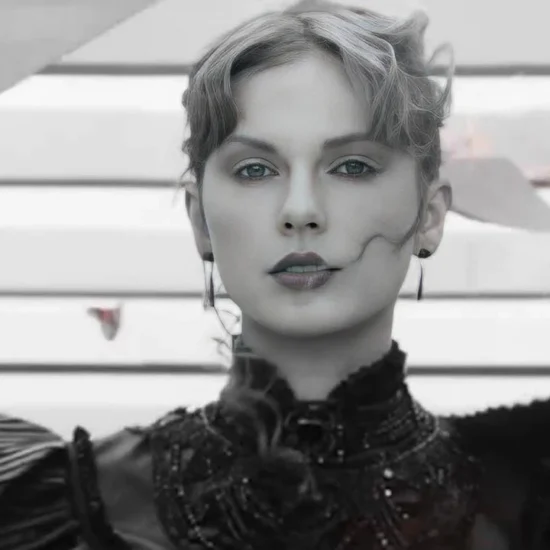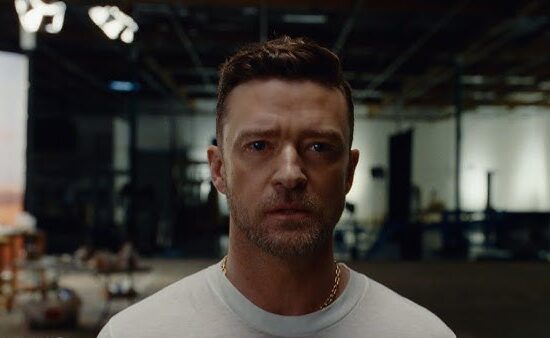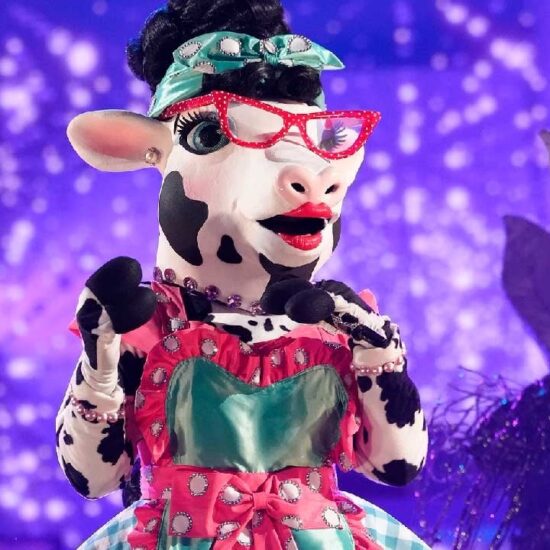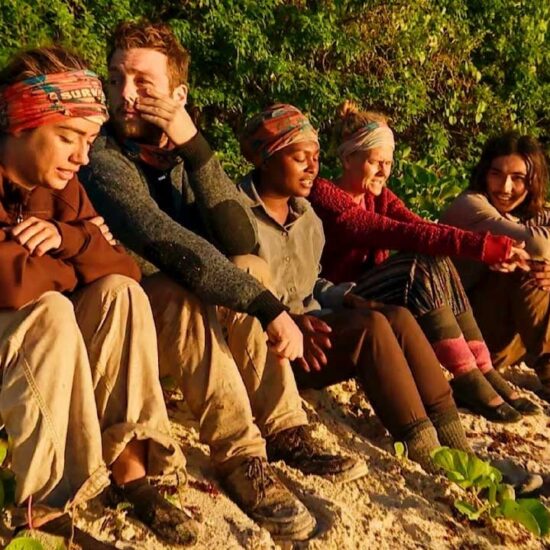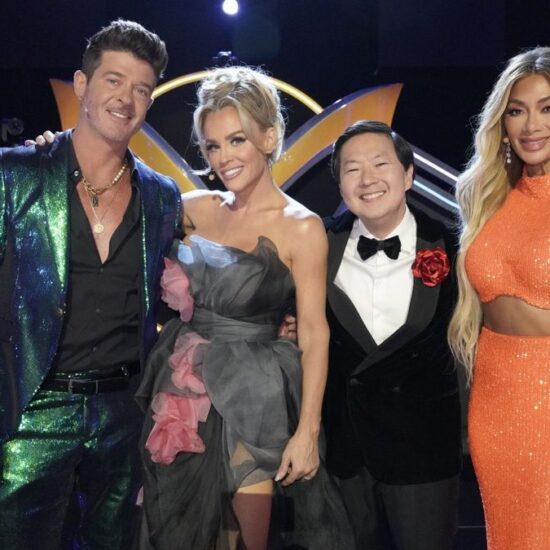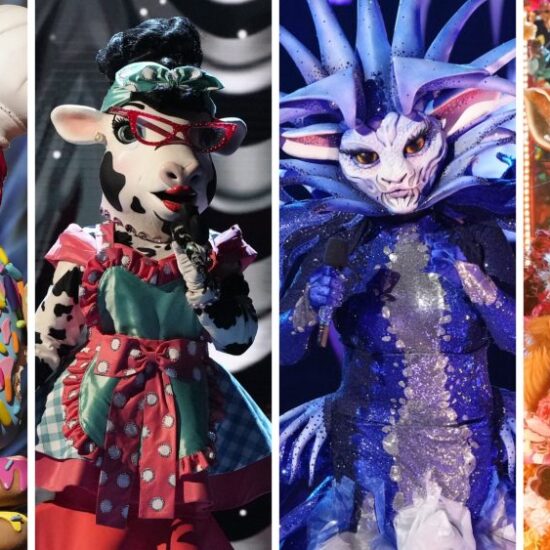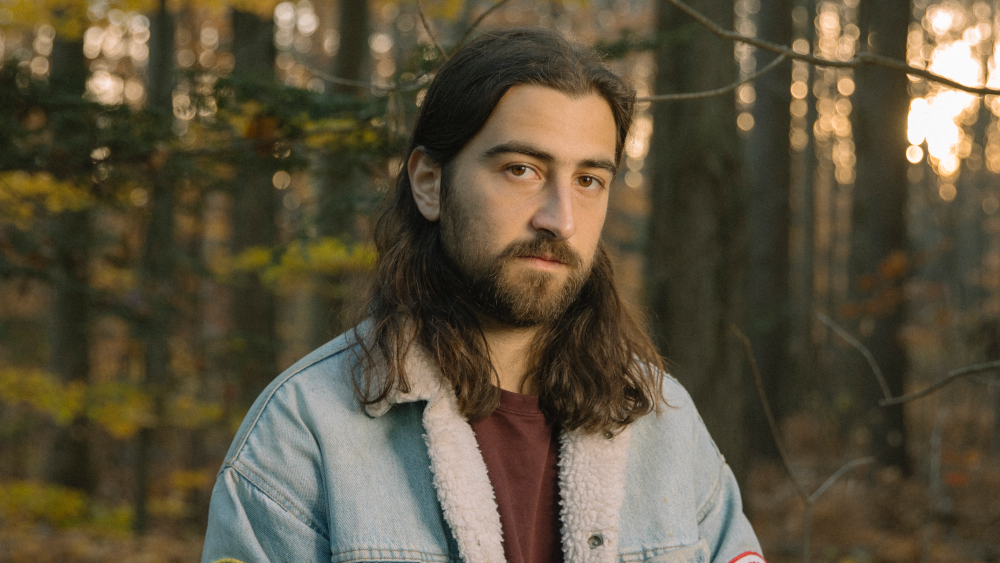
Noah Kahan is Zooming to us right from the heart of Vermont’s stick season, where things are looking cloudy with a chance of multi-platinum. Now, if you happen to know what that “seasonal” reference actually is, you are probably (a) an 80-year-old New Englander who grew up with that term as a euphemism for the dog days of late fall, or (b) one of the millions of people that have taken to the music of Kahan, who spent 2023 becoming a nearly stealth superstar.
With the leaves having fallen off the trees, he’s no longer able to hide in plain sight. Many of his accomplishments are there for all to see: a Grammy nomination for best new artist (for which he may well be the front-runner, out of eight candidates); a first-time “Saturday Night Live” appearance; a summer tour for 204 that has already sold out one night at the Hollywood Bowl (a second was just put on sale) and two nights each at Madison Square Garden and Fenway Park. His fame has grown enough that even non-fans may have learned that “Stick Season,” the title of his breakthrough third album, refers to the fairly forlorn time of year in New England between the leaves falling off the trees and the onset of snow dumps. It is the time of year to get twiggy with it, if you will — and the time to take up Kahan’s music as an antidote. (Even if you’re living in California and don’t so much need it.)
Kahan covered a range of topics in his conversation with Variety: befriending duet partners from Post Malone to fellow best new artist nominee Gracie Abrams; his change of direction from how he started out to the more folk-leaning style that is the one that made him a major pop star; and — just as ironically — why living in a small Vermont town (a real small town; population less than 2,000) forged the identity that is now allowing him to sell out bowls and ballparks.
You recently tweeted a graphic showing your Spotify Wrapped total for the year, which showed that you had an impressive 1.4 billion streams on the service during 2023, representing 46.6 million distinct listeners. You captioned it: “Seasonal affective disorder and its consequences.”
Yeah… people need to get some some vitamin D lamps, dude.
You have a good tweet for everything. When the “Saturday Night Live” appearance was announced, you put up a cute one, tweeting, “This guy’s playing SNL,” with a modest picture of a very young you with… was it reptiles?
Those were my dinos. I was obsessed with dinosaurs when I was a kid.
You also resurrected a tweet from early 2021 where you wrote, “I wanna perform on SNL. I don’t even care if it’s an off-brand version called ‘Sunday Night Live.’” You’ve also talked about how it was a youthful dream to do something with Hozier, which came true when you just got him to sing on a new version of your song “Northern Attitude.” You’ve done quite a job of manifesting things.
Every dream I had, it feels like this year I’ve gotten to have those dreams happen or I’ve gotten close to it, and part of it is scary. You’re happy for your younger self and you’re happy for the kid or the young adult who said he wanted these things, and you’re making him proud when you achieve them. But it always feels surreal to me and I never really get over the craziness of it all, and I never take any of it for granted.
Who knows what Grammy voters will do in the voting for best new artist, but if it were up to a popular acclamation vote right now, you’ve got the momentum that it feels like the masses out there would give that to you. We can thank the Recording Academy for not giving you nominations previously, so you were still eligible for best new artist… even after three albums, two EPs and a deluxe edition over the past five years.
Yeah, I’m appreciative for everybody discovering me now. I have been doing this for a while. But getting nominated alone is like so much of a victory for me, and something that I, for the rest of my life, will be proud of, so I hate to even think to the future. The idea that the momentum was there to put me in the contention is so cool in itself and feels like a victory. So I’m just happy to get to go and bring my mom and have a beer and watch all the amazing other artists and get to know people.
You must not be super-competitive, because you just put out a duet of “Everywhere, Everything” with Gracie Abrams, who’s also up for new artist. Is the timing on that just coincidental? It’s not like a mutual nominee victory lap?
It was completely coincidental. Gracie and I have struck up a friendship over the last year… I’ve always really admired the way she connects with her fan base and the way she feels welcoming to the people that support her, and that’s something that i’ve really tried to do in my career — not only with my touring crew, but I wanted my whole fanbase to feel like a family, and to feel like a community. And I think Gracie’s done an amazing job cultivating that. And I’m also just a massive fan of her songwriting, and her collaborations with Aaron Dessner are always stunning. She was the first person I called after… oh no, that’s not true, I called my mom, but I called Gracie right after (the announcement), because they read her name, and I was so happy for her — and I still didn’t know if they were gonna read mine or not, but I’m like, “Let’s fucking go, Gracie!” This song is kind of the cherry on top, getting a chance to work with her after getting to know her as a friend a little bit. I think the song is really special, and I just think she’s really special. So it’s a good combination.
You’ve also put out new versions of the album tracks with Post Malone, Kacey Musgraves and Lizzy McAlpine as well as Gracie and Hozier. Are you going to go through the whole album that way, to make each track a duet?
Well… anything but making new music, right? [Laughs.] I’m on the road all the time and I don’t have a ton of time to be making a ton of new music, so giving these songs new life was a goal for me from the outset of starting this touring cycle. [With the collaborations], people kept saying yes and being down to do it, and we started being like: Are we going to do the whole record? And I don’t know if we’ll do the whole album, but we certainly have a few more to come. I just think it’s been a really cool exercise in collaboration and creativity to see artists that maybe wouldn’t normally pair together, or artists you’ve always wanted to hear together, getting to rework a song.
And then you reissued some catalog product, for Record Store Day’s Black Friday edition. I have to say, it finally sank in for me just how popular you are via the personal experience of waiting in line before dawn for Record Store Day exclusives, and I thought all the early risers would be there for the Olivia Rodrigo EP, but it turned out everyone directly around me was there for your release — the vinyl reissue of the 2020 EP “Cape Elizabeth.” There’s such a thirst there for more from you, even if it’s something a little bit older that’s rarer and being revived.
You know, I’m blown away every time I see that we’ve sold out of anything. I just have spent a lot of time in my career [not having that]… I literally used to buy tickets to my own shows so that they could almost sell out. I’d have family buy merch. I wouldn’t get anybody guest-list passes. I’d be like, “You have to buy fucking tickets, man. I need to make a living! I need to sell this stuff.” So it’s hard to explain how much it means to me that people are waiting in lines and taking time out of their lives, which are increasingly busy, I’m sure, to come support me and to get something of mine that they’ve connected to.
And that EP in particular is such a special story, because it was right at the beginning of the pandemic, and I just made it with my neighbor, a friend of mine, who’s an amazing producer. We worked on it for a week, and we didn’t really promote it too much — and it kind of became “Stick Season” before “Stick Season” in a lot of ways. It was a study on a place and a relationship in a place, and it was the first time I’d experimented with telling a story that felt like it had an overarching narrative. And it was also the first time that I let myself just not care about how it sounded at the end. Whatever the process was, I just wanted it to make me happy. And to see it connect with people really inspired me to write “Stick Season.” It kind of gave me the confidence to be like, “All right, this niche-specific storytelling stuff can actually connect with people in a more universal way.” I really owe it all to that EP, and it’s still probably my favorite piece of work I’ve made. I just love it.
That answers a question I had, because it does feel like an entry point for “Stick Season,” which was your third album… even though, going back in your discography, I remembered it actually came out between the first and second albums. “Cape Elizabeth” feels like the signal change that pointed to a new direction.
I think I was trying to protect myself from failure — from the feeling of being bad or making something bad — by being like, “It’s just an EP; we’re just going to work on it for a week.” That was my mindset going in. I was like, “If I don’t consider this my next project in a more pronounced or intentional way, then if people don’t like it, it doesn’t matter.” And I think that might not be the healthiest way to approach making music, but I actually think it helped me just let go a little bit of expectation, or of sending my music over to the label every day every time I finish a song, or sending a million people the ideas. It’s stepping into a room and saying “I’m going to make something this week, and whatever it is, it’s going to be what it is, and it’s not going to suffocate under the weight of expectation.” It actually opened up the door to feeling creative freedom, which is something that I took into “Stick Season” on a bigger scale. So it was incredibly important as a blueprint for making music that I’m passionate about, and with a process that I’m passionate about, which had sort of been stagnating for me in my life right before the pandemic. It was a hugely important process and just a really magical experience to say, “Fuck it.” It was fun.
I was watching you recently at the Americana Awards, covering a Paul Simon song with the Milk Carton Kids, and thinking that it was surprising that something Americana, or at least adjacent to that, was a space Republic went after in signing somebody. And then I re-listened to some of your early releases and realized how much things had evolved with you since you got signed. Whther Republic necessarily knew what they’d eventually getting, obviously they’ve gone crazy promoting it. But was there a point in making “Stick Season” where you ever had to say, “This isn’t what I was going after with the first couple albums, but trust me”?
There certainly was never the scary tale of the label saying, “No, you are this person.” They’ve always been supportive of the song, really, whatever the song was for me. I think there was definitely some … I don’t know if concern is the right word, but there were definitely some questions about what I was trying to do. And I think, on my end, there was some lack of clarity. But a lot of it was being like, “Trust me, I need to make this project,” and I continued to show them what was happening as it was being made, which helped them understand what we were doing. But I think it definitely took, yeah, a shift of thinking for my management and my label to be like, “OK, we’re trying to approach the folk base a little bit more” and strategizing change with that direction. But they were really supportive and always willing to hear me out and, when they were accepting of what I wanted to do, they started to allocate their amazing marketing and resources and connections to kind of help me get into the space. I feel really grateful for those connections, because I didn’t have many of them of my own. All I really had was the desire to make this kind of music, and the support of a team that was there for me to make it. So it wasn’t much of a battle, but it definitely took some questioning and some strategizing.
As far as the commercial success, it feels like there has been a series of turning points, more than a single one — even just in the life of this album. Obviously the title song was a success, and then the expanded edition really blew some new life into something that was already going well. Do you feel like the deluxe edition was a turning point in maybe giving the turbo boost to what was already a pretty fast-speeding car?
Yeah, absolutely. It came at a really good time. It was a total fucking pain in the ass to make, because I was on the road and just exhausted. You get two weeks off the road, and that’s not enough time to feel like a human again. So I was right back in the studio, so it was a real labor… a labor of love, but a labor. So when it came out, I was like, “Man, I hope that this helps continue to tell the story. I hope we’re not just making music just to make it.” So when the response to the deluxe version came with such force, it felt very vindicating for that kind of tougher process for me. It did feel like it raised the profile, and it also introduced a new song (“Dial Drunk”), which was going to be a single, which Post Malone jumped on, which kind of skyrocketed things. I mean, I remember the night it came out — my name was trending on Twitter, and I was like, “Oh my God, this is my worst fucking nightmare.”
There’ve been so many moments this year that have been instrumental in informing this phase in my career, but the deluxe version definitely gave us a bigger canvas to paint on and gave us more opportunity to reach a bigger audiences. And so I’m happy I did it, and I’m happy I fucking went crazy making it. Sometimes that’s the point. It’s always a shame when you lose your mind and nobody likes it, and it’s like, “Well, I could have just had a nice, happy couple months there.”
Potential vacation time well spent, there. And now we are in probably the first “stick season” since people everywhere learned what stick season actually is. You’ve talked a lot about the sense of regionality and specificity that has fed into people enjoying this work, and how, as a writer, you don’t always have to go for the most universal thing. We understand why people from New England go crazy over this, but there’s also a sense of people latching on to the New England-ness of it, wherever they are. People in big urban areas can relate to it in their own fashion. Also, small towns have been associated with xenophobia or anger a little bit lately — we had Jason Aldean’s hostile “Try That in a Small Town” — and so maybe people were ready for a return to the romance of small towns, too. Even though there’s a potential depressive aspect of it you bring up, too.
Yeah. To kind of expand on what you’re saying, which I totally agree with, it’s been really cool to see people in cities or places that are far away from New England resonate with these ideas. You know, I lived in New York and felt lonelier than I ever did in Stratford. I think there is loneliness everywhere, and there is isolation and there is nostalgic, homesick, longing everywhere you go. Everybody’s from somewhere, whether that’s New York City or Boise, Idaho or a small town in Ohio. And it’s nice to get a chance to be proud of that, and to examine what makes the place you’re from great, and to examine what makes the place you’re from not so great. So I think what’s been nice has been being able to reflect on my hometown, and to watch other people reflect on where they’re from as well, whether they still live there or not. I think it’s a really interesting exercise.
One thing I love about New England is, there’s some cultural examination that happens, where you can see something and say, “That’s so New England.” You can meet someone and say, “Oh, you’re so northern New England.”
Noah Kahan
Aysia Marotta
In the last song on the album, you talk about driving between towns that have a long distance between them. You’ve certainly talked about how you address mental health stuff, and there’s something about the geography of wider-open spaces, maybe, that appeals to people as they think about maybe a physical or metaphorical manifestation of isolation they might be feeling. They can imagine themselves in that car, driving the half-hour it takes to get to the store, even though that’s not their reality, because of the emotional theme.
Yeah, I think that’s a great point. I hope that people can find in these songs what I found in the space itself, whether or not they have the space. I think being imaginative and dreaming and reflecting when you hear music is my favorite part about music. I can listen to a song and it brings me immediately back to a moment in my life, or a thought that I had, and it doesn’t matter where I am. If I’m on a plane to London or if I’m driving on Mass Ave. in Boston, I still feel like I’m in that moment. So I really hope that these songs bring that to people. What I love about where I grew up is that all the space, and the lack of real things to do besides be outside and think about the woods, lent a lot of imagination to me. It lent a lot of creativity and dreaming and a sense of wondering about why things are the way they are. I think I didn’t have that external stimulus to distract me from deeper thoughts. And so I was grateful for that space, growing up, and I think it led to some more creativity and imagination.
And then just musically, talking about the space your music exists in… You’ve cited people like Cat Stevens, who not everybody of your generation is totally knowledgeable about. And when you were a teenager, things like Mumford and Sons were happening. So tthere’s an interesting cross-generational thing there where it isn’t just ‘70s singer-songwriter music you grew up on, but also this wave of stuff happening that people have called stomp-and-holler. You did an interview where you said you felt like there was “unfinished business” with that wave of music. Do you feel like you’re a combination of some of those influences that were actually 10 years ago, when you were a teenager, and a much longer tradition?
Yeah. I definitely feel like the stomp-and-holler label has been put on me — and that’s totally fine, because I really do connect with that music back then. I certainly don’t feel like I’m “All right, I’m going to bring back Mumford and Sons” or “bring back the Lumineers.” I think I took a lot of what inspired me so much about them into my own music and into my life for the last 10 years.
They write in stories. They use more simple melodies, for sure, and emotional deliveries. But I think the storytelling of that music is always what drew me to it. I always felt like I was, in a really good way, on the outside, looking into something. You know, if you didn’t know about where Mumford and Sons were from, you’d be like, “Man, are you guys from, like, the 1700s? What is your story? What is happening in this music?” And you listen to the Lumineers, and they have records about different places and stories that feel intimate to them, and I always felt like I was reading like a novel. You have this feeling of being left out that makes you want to dig back in and be a part of it and understand all of it. Outside of their incredible live shows, I always appreciated the way they approach writing with stories and using different extended storylines in different songs, and having kind of Easter eggs was always really interesting to me. I think a lot of that kind of stuff was carried on through other artists like Sam Fender and Phoebe Bridgers, who kind of gave you that outside-looking-in feeling as well that I always really loved.
So I’m happy to have the parallel be drawn to me, because I always thought that their songwriting was really interesting and inspired me so much. I have absolutely no qualms whatsoever with the comparison, and I’m honored. I’m happy that storytelling is at the forefront. I think it’s important that things advance always, for a better future, in the way we’re making music and thinking about how to present the music. But I think it’s important to hearken back to the great storytellers of our time. You look back at Paul Simon, Cat Stevens, James Taylor, and you look to the more recent ones as well, and you hope that that continues to happen. You know, I’m not saying that I’m a master storyteller, but I’m gonna keep trying to keep telling stories, like my heroes did.
Certainly you’ve got appeal for an older audience as well as a younger one. There’s a certain agelessness to some of it. I was looking at a concert review where the reporter said you said, “I know I look like I’ve been through a grisly divorce and custody battle, but I’m only 26.” And it was funny, because then I did see like a photo of you in high school, where you had short hair and no beard and it was immediately clear how young you were… and you’re not so many years beyond that at this point. But then there’s something about the long hair and the beard where, like with the Beatles in “Let It Be,” they suddenly look 40 instead of in their 20s, or maybe really ageless… But you’re as old as you feel. So maybe the question is: How old do you feel right now?
Oh my God. The other day, my tour manager said that being in the new music industry ages you eight years every year, especially the touring industry. I feel old right now. I get up and my fucking back hurts. … I was in my high school alumni soccer game the other day, and I could barely move. I feel like I’ve always felt older, though. People call it being an old soul, but I always thought that that was just a nice way of saying: “You have depression and you’re 9.”
But I do feel that, although this year has been incredible, it’s also been emotionally and physically really tiring. So I’ve been trying to find the time to feel like a kid, and to feel 26, but it’s hard. There’s so much going on, and I find myself not letting myself totally enjoy all of it. Sometimes I feel like I have a hard time grasping the moments and processing them.
You saw a picture of me with short hair. I looked like a little salamander — like a 9-year-old kid. And I like this look better because it allows me to not shower. And it’s kind of the brand! From the beginning, I said I wanted to make my brand be the least amount of self-care I possibly have to do to be acceptable. And if I can pass that along to my fellow depressed burnout friends, then that’d be great.
You do have a long year ahead, with so much touring — including accompishments like selling out the Hollywood Bowl, selling out two nights at Madison Square Garden, two sold-out nights at Fenway Park. So it’s not like 2024 is a year to dread. But do you get to have a break, before you go do Europe in advance of returning to the States in the summer?
Yeah, we get a little break, which is nice. We get about a month, but I’m probably gonna try to make some music. And making the music is the part that feels the most rewarding to me. So I’m hoping to get a chance to rest, recalibrate, make some more music, and also just kind of stay in one place. I feel like I keep getting up and going to the store or driving into Lebanon or driving to Boston because I just don’t want to be in one spot. So I’m just gonna force myself to sit in a room and chill out the fuck out for a second. But after the break, then we start the year in Mexico, which is gonna be nice because we’ll be on the warm beach. Then we go to Australia, and it’s summer there, so there’s some warm torrent and international torrent coming up at the very least.
In the meantime, you’ve got some cold to contend with, staying home… which you’ve also made the brand. I was imagining that maybe the Vermont tourism Board should capitalize on this. They could have a “Come to Vermont for stick season!” campaign and make November their big touring season. Like: Relive the Noah Kahan album! Come during the dreariest part of fall!
I think if you know anything about Vermonters, they will fucking hate that. They’ve been so supportive, and I think a bunch of people coming in… You know, it’s funny. Vermont needs more people to live there, but there’s also a part of the pride of being from Vermont that’s like, “Don’t come here. This is our place.” So I try not to step on any toes in that way and exploit anything. But I do think that more people are interested in stick season, and I’ve been hearing more people use the term, and as a Vermonter, that does make me proud.
Kahan’s 2024 tour dates:
WE’LL ALL BE HERE FOREVER TOUR 2024 AUSTRALIA, UK + EUROPE DATES:
January 17 Melbourne, AU Sidney Myer Music Bowl – SOLD OUT
January 18 Melbourne, AU Sidney Myer Music Bowl – SOLD OUT
January 20 Brisbane, AU Riverstage – SOLD OUT
January 23 Sydney, AU The Hordern Pavilion – SOLD OUT
January 27 Perth, AU Red Hill Auditorium – SOLD OUT
February 08 Dublin, IE 3Arena – SOLD OUT *
February 10 Glasgow, UK OVO Hydro – SOLD OUT *
February 11 Leeds, UK First Direct Arena – SOLD OUT *
February 13 Cardiff, UK Cardiff International Arena – SOLD OUT *
February 14 London, UK OVO Arena Wembley – SOLD OUT *
February 15 London, UK OVO Arena Wembley – SOLD OUT *
February 17 Paris, FR L’Olympia – SOLD OUT *
February 18 Cologne, DE Palladium – SOLD OUT *
February 21 Berlin, DE Columbiahalle – SOLD OUT *
February 23 Copenhagen, DK K.B. Hallen – SOLD OUT *
February 25 Amsterdam, NL AFAS Live – SOLD OUT *
February 26 Brussels, BE Forest National *
WE’LL ALL BE HERE FOREVER TOUR 2024 NORTH AMERICA DATES:
March 2 Tempe, AZ Extra Innings Festival ~
March 26 Vancouver, BC Rogers Arena – SOLD OUT
March 28 Calgary, AB Scotiabank Saddledome – SOLD OUT
March 29 Edmonton, AB Rogers Place – SOLD OUT
March 30 Saskatoon, SK SaskTel Centre
April 02 Winnipeg, MB Canada Life Centre
April 06 Toronto, ON Scotiabank Arena – SOLD OUT
April 07 London, ON Budweiser Gardens – SOLD OUT
April 09 Ottawa, ON Canadian Tire Centre – SOLD OUT
April 10 Quebec City, QC Videotron Centre
April 13 Montreal, QC Bell Centre – SOLD OUT
April 14 Toronto, ON Scotiabank Arena – SOLD OUT
April 16 Toronto, ON Scotiabank Arena – SOLD OUT
April 20 North Charleston, SC High Water Festival ~
May 3 Atlanta, GA Shaky Knees Festival ~
May 5 Charlotte, NC Lovin’ Life Music Festival ~
May 20 Asheville, NC ExploreAsheville.com Arena – SOLD OUT
May 22 Asheville, NC ExploreAsheville.com Arena – SOLD OUT
May 24 Nashville, TN Bridgestone Arena – SOLD OUT
May 25 Nashville, TN Bridgestone Arena – SOLD OUT
May 28 Cuyahoga Falls, OH Blossom Music Center – SOLD OUT
May 29 Burgettstown, PA The Pavilion at Star Lake – SOLD OUT
June 01 Lexington, KY Railbird Music Festival ~
June 04 St. Louis, MO Hollywood Casino Amphitheater – SOLD OUT
June 05 Kansas City, MO Azura Amphitheatre – SOLD OUT *
June 07 St. Paul, MN Xcel Energy Center – SOLD OUT
June 08 St. Paul, MN Xcel Energy Center – SOLD OUT
June 11 Dallas, TX Dos Equis Pavilion
June 13 Houston, TX The Cynthia Woods Mitchell Pavilion – SOLD OUT
June 14 Austin, TX Moody Center – SOLD OUT
June 15 Austin, TX Moody Center – JUST ADDED
June 18 Chula Vista, CA North Island Credit Union Amphitheatre
June 20 Los Angeles, CA Hollywood Bowl – JUST ADDED
June 21 Los Angeles, CA Hollywood Bowl – SOLD OUT
June 25 Denver, CO Fiddler’s Green Amphitheatre – SOLD OUT *
June 26 Denver, CO Fiddler’s Green Amphitheatre – SOLD OUT *
June 29 George, WA The Gorge – SOLD OUT
July 01 Ridgefield, WA RV Inn Style Resorts Amphitheater – SOLD OUT
July 03 Wheatland, CA Toyota Amphitheatre
July 05 Berkeley, CA The Greek Theatre – SOLD OUT *
July 06 Berkeley, CA The Greek Theatre – SOLD OUT *
July 09 Salt Lake City, UT USANA Amphitheatre – SOLD OUT
July 13 East Troy, WI Alpine Valley Music Theatre – SOLD OUT
July 15 New York, NY Madison Square Garden – SOLD OUT
July 16 New York, NY Madison Square Garden – SOLD OUT
July 18 Boston, MA Fenway Park – SOLD OUT ^
July 19 Boston, MA Fenway Park – SOLD OUT ^
August 2 Montreal, QC Osheaga Festival ~
SUMMER 2024 UK + EUROPE DATES:
August 13 Manchester, UK Co-op Live *
August 14 Newcastle, UK Utilita Arena *
August 20 Birmingham, UK Utilita Arena *
August 21 London, UK The O2 *
August 24 Amsterdam, NL Ziggo Dome *
August 26 Hamburg, DE Stadtpark Open Air *
August 27 Berlin, DE Zitadelle Spandau









